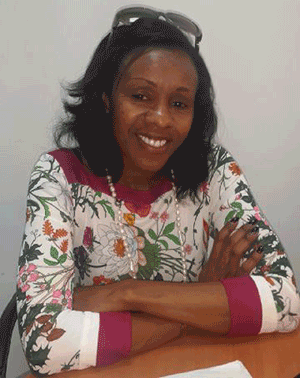Business owners across Africa lament negative growth on investment despite expanding economic indicators.
From fast moving consumer goods (FMCG) to service providers, business is slow and dull, as inflation is on the rise and insecurity breaks loose.
EXP Group Chief Executive Officer, Carol Abade, who is based in Johannesburg, South Africa as global head of the social and experiential marketing organisation, says the negative impact is caused by a lack of government spending and rising inflation.
Abade spoke to GODDIE OFOSE when she visited Nigeria for the second edition of the African experiential marketing summit in Lagos.
Assessment of business in Africa
Carol Abade
Africa is an interesting place because it is full of surprises. There are a lot of positive view points with everybody looking at Africa as the next place to get real value for investment.
It’s a good thing because it means that people are seeing that the effort made to build infrastructure and investment opportunity will pay off in the long term.
Having said that, Africa is still a difficult place to do business. One has to be clearly differentiated, able to understand the different laws in all the different countries, and also understand there is a long term investment requirement to doing business on the continent.
If you can understand those things then I think the opportunities are still there for any industry.
Exploiting Africa’s investment hub
The top 10 growth countries are on the continent, so the economic indicators are all there. There has been a lot of drive on infrastructural development in many countries in Africa; it may not be to the level that everybody expected, but definitely there have been huge changes on the continent.
Difference between growth indicators and real development
It took Europe hundreds of years to get to where it is, so we mustn’t compare so quickly. Africa is unique in many respects. Development indicators must be seen in people and resources, in infrastructure and also the standard of living. Those are the important things that must be measured.
We are seeing a big globalisation, what mobile communication technology has done for the continent by opening up communication. We are seeing a lot of regulatory bodies that ensure that this growth is managed for the benefit of the people, not the big corperation’s.
That’s where our requirement is going to come in; to say, are we seeing real improvement in people’s lives with all these investments?
Justification for economic indicators
It’s a tough one because a lot of those indicators are the responsibilities of the government. It’s going to be a question of how are we holding our government accountable to spend, because if the government is not delivering on the critical areas and yet tax payers are delivering, then the accountability becomes ours. But this is not to say that there is no growth; there may be waste.
Assessment of African marketing communications industry, having worked in over 12 countries on the continent
There has been a huge shift in driving communication through insights. There are more requirements for local communication as opposed to where we were five to 10 years ago, when it was global communication.
You have the free will to determine what will work for your market and what you can put out there that is relevant for your consumers. That is a big paradigm shift and I think the marketing discipline has gone through a big area of shift and exposure.
The internet has done a really good job in giving people global access to what is happening with brands across the world. That is why, from an EXP perspective, the assignment is really important for us because it is really the point we can showcase what global leadership is from an experiential perspective.
If the whole industry takes it over then it can only be for the benefit of clients. It is open to anybody because we believe that if there is a total improvement in the industry in a macro perspective, it can only benefit the industry, consumers and brands.
Foreign infusion
It is a sharing balance I see across. I see a lot of companies sending their marketing executives to other markets to get their experience, and other executives sent to our markets to see how it is different working in developing markets.
I think it’s a fair exchange, and ultimately what we want to see happening is that even when there is that exchange, when they come back they will be adding value.
I don’t see it as being dominated by foreigners any more. It’s a sign that there is a big change of resource in the marketing teams than there was before.
Impact of Africa experiential marketing summit held in Lagos last year
We are only working on the initial indicators of one summit. Last year, the summit was very successful and the feedback from participants was great. We incorporated some of those feedbacks by bringing in speakers with relevance and by trying to bring the African tracking of what’s going on across the continent.
The market was ready to receive a summit willing to share global best practice from an experiential perspective and that opportunity is what we are giving to the market.
I cannot say much on the basis of one. Maybe if we do three or four we will be able to assess the real impact of that investment from a business perspective.
Traveling to the U.S. for summit
If you are looking for global thinking and more global experience then Chicago is not a bad place to be, because it offers you more than one global speaker.
So, what we are doing is bringing the best of Chicago to Africa. Therefore, we are repackaging Chicago. To be honest, in another couple of years there will be no reason to go to Chicago because we repackage everything that is there and bring it to the market.
Assessment of Nigerian market
This market is much more vibrant, and also allows for innovation. That is a good thing about sitting in markets that are developing. There is a lot of scope to try new things and to change things and also to innovate. In more established markets, that scope is very difficult.
People are asserting their ways, and want to do things in certain ways too. To make that change in this shift or to get the business to support it is completely difficult.
Is business drying up in developed markets?
I don’t think so. The economic situation affects almost everybody, so I don’t think it is necessarily drying up. They went through an economic slump; we may also go through one. During that time clients cut back on budget.
Our business is about being able to deliver value, and value is in profit. That is gradually missing in some developed markets and if there is no justification for big marketing spend the client will question that.
First half of 2014
Last year was far better than this year in real growth numbers. We are not seeing double digit growth any more, we are seeing much bigger cuts in marketing spend than we saw in the same period last year.
We hope the year will end on a positive note, but at the moment I think this year is harder than last year.
Factors that necessitate this bad business
It’s not bad business; it is just that the economic situation is tough in many markets. Security is an issue because it impacts on investment.
Growth is an issue. If government spend is not coming in then there is no money in the hands of consumers, and you know inflation is rising. All these are factors.
Service providers taking over experiential marketing deployment instead of FMCG
Fast moving consumer goods (FMCG) will always lead experiential because of the requirement for deep consumer engagement for long term brand value. They were the founders of experiential and they will remain the founders of experiential.
Mobile telephone operators came in with big acquisition budget because they needed to get the numbers quickly, and obviously they were a much more profitable sector than the FMCG’s, but FMCG is consistently building brand value.
They are still the biggest firms in experiential globally.
Most difficult market in the 12 countries you have worked
They all have a different set of challenges. If I have to generalise then I think our biggest continental challenge is how to maintain and keep good talents.
Does that stop you from grooming talents?
Not at all, we will always be the training ground because we are the leaders in the industry.
My top five competitors have passed through EXP, and in some way, maybe we should be proud of that because it means that our training was effective. They learnt a lot and are able to go out there and make a living out of it.
That is a positive thing.
Any regret when your proteges compete against you?
Not at all, I think it’s a good thing. I think that’s a business in which you must also measure your ability to change lives.
If the person that came to your system was a better person leaving your system then you have done a good job.
Value of this industry in Africa
I don’t know; it is not being measured in cash to the extent of advertising and media. So, I honestly cannot say. I can’t put a number to it.
On lack of data to evaluate the industry
We have recognised that measurement is an issue, and that has become a key driver right now in terms of building real measurement matrix into all our activations.
As lead agency we have developed real measurement analytics now that will definitely change the way people see and view us, even our clients. But that is a secret.
Industry in the next few years
Mobile telecommunication will transform the way we speak to consumers big time. It has already started – that sort of integration and understanding that people’s lives are in their pockets, easy communication, they can post stuff, they can give you quick updates of what they like and what they don’t.
That is the future of our industry, without a doubt. And I hope I shall not be proved wrong, without a doubt.














